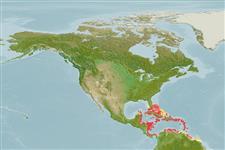>
Eupercaria/misc (Various families in series Eupercaria) >
Scaridae (Parrotfishes) > Sparisomatinae
Etymology: Sparisoma: Latin, sparus = a fish with a golden head + Greek, soma = body (Ref. 45335).
More on authors: Bloch & Schneider.
Environment: milieu / climate zone / depth range / distribution range
Sinh thái học
Biển Cùng sống ở rạn san hô; Mức độ sâu 1 - 15 m (Ref. 9710). Tropical; 28°N - 4°N, 89°W - 51°W
Western Atlantic: Caribbean Sea.
Bộ gần gũi / Khối lượng (Trọng lượng) / Age
Maturity: Lm ? range ? - ? cm
Max length : 46.0 cm TL con đực/không giới tính; (Ref. 7251); common length : 25.0 cm TL con đực/không giới tính; (Ref. 3802)
Các tia vây lưng cứng (tổng cộng): 9; Các vây lưng mềm (tổng cộng): 10; Tia cứng vây hậu môn 3; Tia mềm vây hậu môn: 9. Young adults with black saddle-shaped markings at upper end of pectoral fin base; often vague, pale saddle-shaped area on top of caudal peduncle; and dorsal, anal, and pelvic fins red or orange (Ref. 26938).
Occurs in coral reefs and adjacent habitats, the young especially in seagrass beds. Juveniles or primary-phase adults rapidly assume a mottled pattern with which they blend with the substratum when they come to rest on the bottom. Feeds on benthic algae and seagrasses.
Life cycle and mating behavior
Chín muồi sinh dục | Sự tái sinh sản | Đẻ trứng | Các trứng | Sự sinh sản | Ấu trùng
Although protogyny was propossed for this species (Ref. 27876), probably because testicular characteristics showed a secondary characteristic of sex-changed males, observations of overlapping size ranges of males and females, and males maturing at the same ages and sizes as did females, strongly suggest gonochorism (Ref. 103751).
Robins, C.R. and G.C. Ray, 1986. A field guide to Atlantic coast fishes of North America. Houghton Mifflin Company, Boston, U.S.A. 354 p. (Ref. 7251)
IUCN Red List Status (Ref. 130435)
Threat to humans
Reports of ciguatera poisoning (Ref. 30303)
Human uses
Các nghề cá: buôn bán nhỏ; Bể nuôi cá: Tính thương mại
Thêm thông tin
Các tài liệu tham khảoNuôi trồng thủy sảnTổng quan nuôi trồng thủy sảnCác giốngDi truyềnElectrophoresesDi sảnCác bệnhChế biếnNutrientsMass conversion
Các công cụ
Special reports
Download XML
Các nguồn internet
Estimates based on models
Preferred temperature (Ref.
123201): 26.5 - 28.3, mean 27.6 °C (based on 471 cells).
Phylogenetic diversity index (Ref.
82804): PD
50 = 0.5000 [Uniqueness, from 0.5 = low to 2.0 = high].
Bayesian length-weight: a=0.01072 (0.00697 - 0.01647), b=3.10 (2.97 - 3.23), in cm total length, based on LWR estimates for this species & Genus-body shape (Ref.
93245).
Mức dinh dưỡng (Ref.
69278): 2.0 ±0.0 se; based on diet studies.
Generation time: 1.8 ( na - na) years. Estimated as median ln(3)/K based on 2
growth studies.
Thích nghi nhanh (Ref.
120179): Chiêù cao, thời gian nhân đôi của chủng quần tối thiểu là dưới 15 tháng (K=0.7).
Fishing Vulnerability (Ref.
59153): Low vulnerability (23 of 100).
Nutrients (Ref.
124155): Calcium = 54.9 [32.2, 104.2] mg/100g; Iron = 0.781 [0.413, 1.321] mg/100g; Protein = 18.5 [16.3, 20.9] %; Omega3 = 0.0942 [, ] g/100g; Selenium = 33.3 [18.8, 63.7] μg/100g; VitaminA = 34.7 [10.3, 119.0] μg/100g; Zinc = 1.64 [1.12, 2.59] mg/100g (wet weight);
